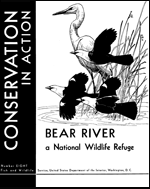United States Fish and Wildlife Service

United States Fish and Wildlife Service: Publications
Date of this Version
2017
Citation
Wildlife Society Bulletin 41(3):442–452; 2017; DOI: 10.1002/wsb.780
Abstract
Prescribed fire is used to reverse invasion by woody vegetation on grasslands, but managers often are uncertain whether influences of shrub and tree reduction outweigh potential effects of fire on nest survival of grassland birds. During the 2001–2003 breeding seasons, we examined relationships of prescribed fire and woody vegetation to nest survival of clay-colored sparrow (Spizella pallida) and Savannah sparrow (Passerculus sandwichensis) in mixed-grass prairie at Des Lacs National Wildlife Refuge in northwestern North Dakota, USA.We assessed relationships of nest survival to 1) recent fire history, in terms of number of breeding seasons (2, 3, or 4–5) since the last prescribed fire, and 2) prevalence of trees and tall (>1.5 m) shrubs in the landscape and of low (≤1.5 m) shrubs within 5 m of nests. Nest survival of both species exhibited distinct patterns related to age of the nest and day of year, but bore no relationship to fire history. Survival of clay-colored sparrow nests declined as the amount of trees and tall shrubs within 100 m increased, but we found no relationship to suggest nest parasitism by brown-headed cowbirds (Molothrus ater) as an underlying mechanism. We found little evidence linking nest survival of Savannah sparrow to woody vegetation. Our results suggest that fire can be used to restore northern mixed-grass prairies without adversely affecting nest survival of ≥2 widespread passerine species. Survival of nests of clay-colored sparrow may increase when tall woody cover is reduced by fire. Our data lend support to the use of fire for reducing scattered patches of tall woody cover to enhance survival of nests of ≥1 grassland bird species in northern mixed-grass prairies, but further study is needed that incorporates experimental approaches and assessments of shorter term effects of fire on survival of nests of grassland passerines.


Comments
U.S. government work.